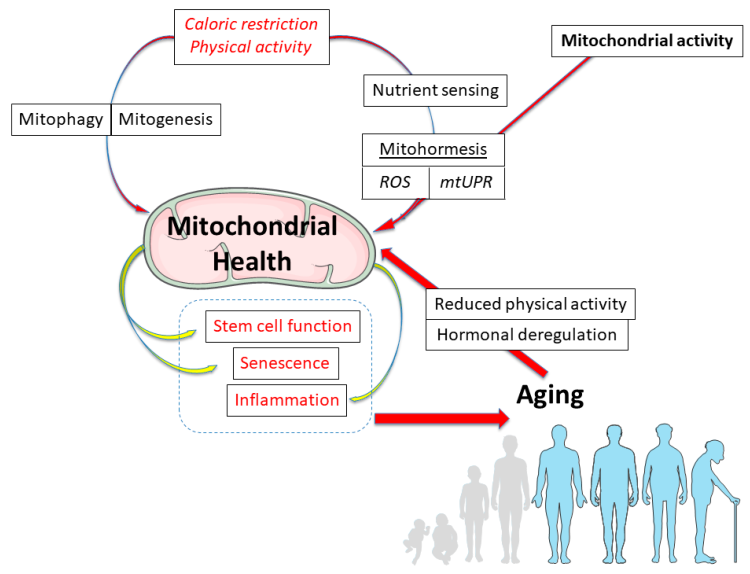High Intensity Interval Training (HIIT) training has been around for a couple of decades in one form or another. It’s been touted to increase weight loss, rev up metabolism, increase testosterone in men, and do it all in less time than most training sessions (Robinson et al., 2017). The scientific research seems to be adding up more and more to short intense exercise sessions as the best option towards better health and fitness. Now there’s even more reason to utilize HIIT training into your exercise program; to prevent aging (Gillen, & Gibala, 2014)!
What is HIIT?
First let’s be sure we’re all on the same page about what high intensity interval training is. HIIT is a type of training method in which you perform a quick, intense burst of exercise, and follow up with a short, and sometimes active, recovery period and repeat the process. There are many different styles to HIIT training but paramount in all types is the fact that you keep your heart rate up for most of the workout. The purpose of a high-intensity workout is to increase the body’s need for oxygen with high intensity exercises that can be sustained for a long enough period of time to create an oxygen deficit. This oxygen deficit requires more oxygen from the body during recovery. This effect of increased oxygen demand during recovery is often referred to “afterburn” in the fitness world. In the scientific community it is called excess post-exercise oxygen consumption (EPOC) and it is the reason why high intensity interval training helps you burn more fat and calories than steady-state aerobic workouts (McCall, 2014).
How Does HIIT Prevent Aging?

Figure 1. The Aging Mitochondria | Reprinted from Theurey, & Pizzo, 2018. The Aging Mitochondria. Genes 2018, 9, 22. Reprinted with permission.
There’s been a lot of research on aging and there are many factors that contribute to it, but one important factor that’s been getting a lot of attention is the decline of mitochondrial function. In Figure 1. you’ll notice a lot going on and it’s quite complicated to get into all of the factors that contribute to aging. That said, notice that there are two very important factors on the top that we can control, physical activity and caloric restriction. How caloric restriction and diet can lessen aging will have to be another article, but physical activity is one factor that we can easily control. As stated earlier, the most efficient way to boost mitochondrial function and delay aging is through HIIT training protocols.
As stated in a study by Cell Press:
HIIT “…actually seemed to reverse the age-related decline in mitochondrial function and proteins needed for muscle building” (Cell Press, para. 5, 2017).
What Kind of HIIT Program Can I Do?
Most researchers will agree that any exercise is better than none at all, however, since HIIT is the most efficient and effective why not give it a try? Of course, the type of routine and what you perceive as HIIT will vary greatly depending on your level of fitness so I have put together three different routines to challenge you within your fitness level.
Since I don’t have room in this article to show each exercise I have inserted links to uncommon exercises for your convenience, if you’re unsure about an exercise I’m sure you can find it on YouTube but please go to a reputable personal trainer or Men’s Health for proper form.
Beginner HIIT Routine (about 15-20 minutes):
3 Rounds (with 30-60 seconds rest between each round)
Jump rope 25 sec.
Rower 60 sec.
Kettlebell Swings 25 sec.
Rest 30-60 sec.
3-5 Rounds (with 30-60 seconds rest between each round)
Burpees 5 reps
Squats 10 reps
Mountain Climbers 15 (each side)
Rest 30-60 sec.
Intermediate HIIT Routine (about 20-25 minutes):
4 Rounds (with 30 seconds rest between each round)
Jump rope 60 sec. (as fast as possible)
Rower 60 sec. (as fast as possible)
Kettlebell Swings 30 sec.
Rest 30 sec.
5 Rounds (with 30 seconds rest between each round)
Burpees 10 reps
Renegade Rows 10 reps (each side)
Skater Jumps 10 reps (each side)
Mountain Climbers 20 (each side)
Rest 30 sec.
Advanced HIIT Routine (about 25-30 minutes):
4 Rounds (with 15-20 seconds rest between each round)
Rower 60 sec. (as fast as possible)
Jump rope 60 sec. (as fast as possible)
Man-makers 30 sec.
Double Kettlebell Swings 30 sec.
Rest 15-20 sec.
3 Rounds (with 15-20 seconds rest between each round)
Tuck Jumps 10 reps.
Renegade Rows w/ pushups 10 reps. of each
Jump rope 60 sec. (as fast as possible)
Rest 15-20 sec.
3 Rounds (with 15-20 seconds rest between each round)
Wood chops 10 reps. (each side)
Skater Jumps 30 sec. (as fast as possible)
Jump rope 60 sec. (as fast as possible)
Rest 15-20 sec.
Although HIIT training isn’t easy it is short in duration and extremely effective for both weight loss and to stave off aging. Try the HIIT workouts above at most once or twice a week, only once a week if you’re a beginner, to prevent overtraining and overuse injuries. I recommend that you perform strength training on 2 or 3 other days of the week and one day of low intensity aerobics, like steady state cycling or treadmill work. Varying your overall routine will work your mitochondria in different ways while also strengthening your muscles and bones which are essential for longevity! Now you’ve got a plan to halt aging, GO DO IT!
References
Coghlan, A. (2017). Interval training rejuvenates ageing cells. New Scientist, 233(3116), 11.
Cell Press. (2017, March 7). How exercise — interval training in particular — helps your mitochondria stave off old age. ScienceDaily. Retrieved August 13, 2018 from https://www.sciencedaily.com/releases/2017/03/170307155214.htm
Gillen, J. B., & Gibala, M. J. (2014). Is high-intensity interval training a time-efficient exercise strategy to improve health and fitness? Applied Physiology, Nutrition, and Metabolism, 39(3), 409–412. https://doi.org/10.1139/apnm-2013-0187
McCall, P., (2014). Excess Post-Exercise Oxygen Consumption (EPOC) | ACE Blog Retrieved August 14, 2018 from https://www.acefitness.org/education-and-resources/professional/expert-articles/5008/7-things-to-know-about-excess-post-exercise-oxygen-consumption-epoc
Robinson, M. M., Dasari, S., Konopka, A. R., Johnson, M. L., Manjunatha, S., Esponda, R. R., Nair, K. S. (2017). Enhanced Protein Translation Underlies Improved Metabolic and Physical Adaptations to Different Exercise Training Modes in Young and Old Humans. Cell Metabolism, 25(3), 581–592. https://doi.org/10.1016/j.cmet.2017.02.009
Sun, N., Youle, R. J., & Finkel, T. (2016). The Mitochondrial Basis of Aging. Molecular Cell, 61(5), 654–666. http://doi.org/10.1016/j.molcel.2016.01.028
Theurey, P., & Pizzo, P. (2018). The Aging Mitochondria. Genes, 9(1). Retrieved August 13, 2018 from https://doi.org/10.3390/genes9010022

